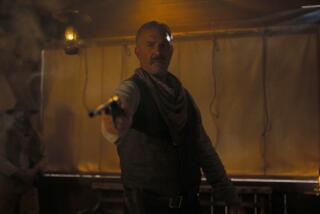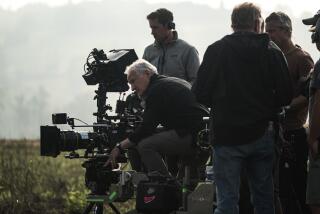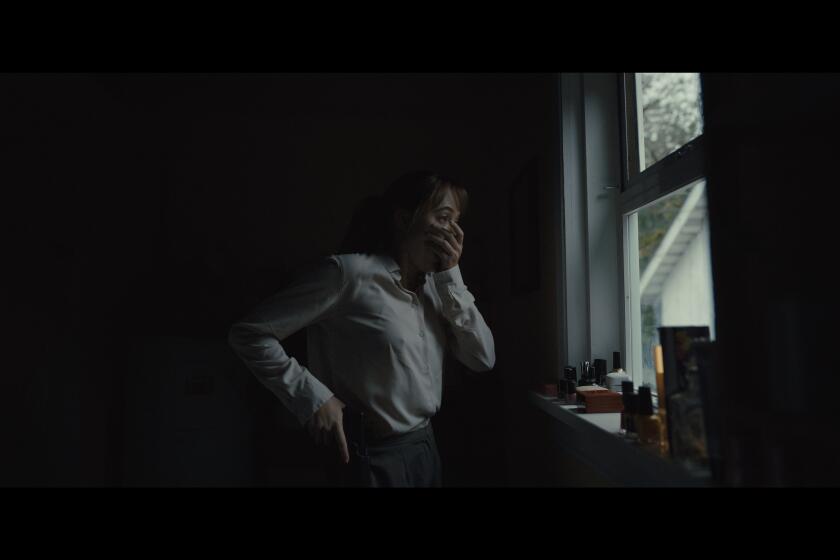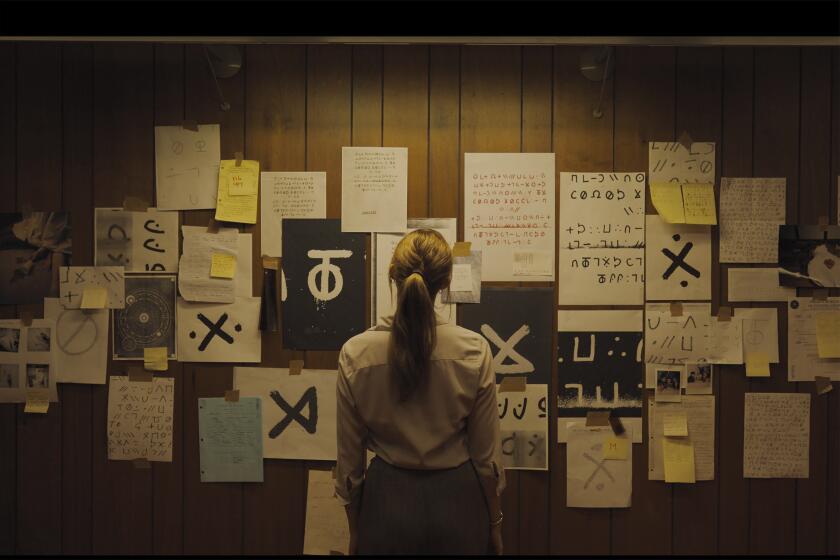Gibson Talks About Film, Furor and Faith
The culture wars over “The Passion of the Christ” seem to be taking a toll on Mel Gibson. He might be lolling around one of the most luxurious hotels in Los Angeles, but he has clearly brought his personal bunker with him. In the course of a half-hour conversation, he appears alternately embattled and exhausted, angry and self-pitying. There is a sense that the world is divided into those who are for him and his “Passion,” and those who are against.
His film is on the verge of release, and even the outraged criticism seems to be buoying it toward a big opening. Yet Gibson is not happy. “I’m subjected to religious persecution, persecution as an artist, persecution as an American, persecution as a man,” he says.
“These things have happened in the last year. I forgive them all. But enough is enough. They’re trying to make me some cult wacko. All I do is go and pray. For myself. For my family. For the whole world. That’s what I do.”
He has spent the last few days talking to handpicked members of the media, trying to dispel any notion that his film -- which graphically depicts the last 12 hours in the life of Christ -- blames Jews for the killing of Jesus, or is in any way anti-Semitic.
“I’ve taken every opportunity to say this out there and publicly: This is not the blame game.... I understand that some may have fears
The Passion play has a long history as a vehicle that has fomented anti-Semitism. For the last year, Gibson has been embroiled in a controversy with a group of Jewish and Christian scholars and activists who criticized the script as having the potential to incite anti-Semitism. They now openly criticize the film, which they say portrays Jews negatively. From Gibson’s point of view, he was ambushed, his rights as an artist violated before he had even finished making his film.
From the beginning, Gibson, the Oscar-winning actor-director, was going to make the movie he wanted to make. That’s why he put up his own money -- $25 million -- to make it. That’s why he is supervising the release, and why he is barnstorming the country showing the film to thousands of churchgoers.
Although there is a fiction out there that this is the movie that no distributor would touch, it appears that Gibson really wanted to control the process. At least two studio chiefs have said they called Gibson about seeing the film in order to release it, but were politely rebuffed.
“When he started, he actually said this phrase to me: ‘No one is going to see this thing. It’s just for me,’ ” recalls producer Dean Devlin, a friend.
Given that early audience tracking forecasts suggest that “The Passion of the Christ,” -- even with its protracted torture sequences, R-rating and dialogue in Aramaic and Latin -- could earn grosses of $30 million in its opening days, it’s strange to find Gibson so beleaguered. Yet the 48-year-old actor barely speaks above a whisper, as if trying to keep a tight fist around his emotions.
For Gibson, to focus solely on the background of the story is to ignore the point of the movie, which in his eyes is “the sacrifice made by the savior of all mankind. It’s pre-ordained.... Now, the message he brought was one of peace and love and tolerance -- all the messages of tolerance that I put in there, particularly toward the end.... I think it’s pretty hard to misunderstand.”
Gibson thinks his critics will never give him a fair hearing. He has refused to put any disclaimers at the end of the film, and has refused to show the largely completed work to the people he views as enemies. They include Frank Rich and Tim Rutten, columnists for the New York Times and Los Angeles Times, respectively, who have written critically about the project. In Gibson’s mind, they are in the same league with whoever leaked that early script, whoever pirated an unfinished cut of the movie and provided it to the New York Post.
“They want me to be angry, these guys, the Frank Riches, the Ruttens, my detractors,” Gibson says. “They need me to be angry at them. I’ve resisted it. I haven’t been angry at all. I have a right to be indignant, I think.... I didn’t invite them [to early screenings of the movie] because they already prejudged it.”
(Gibson was quoted in the New Yorker magazine last year as saying about Rich: “I want to kill him. I want his intestines on a stick.... I want to kill his dog.” Both columnists say they have been rebuffed many times in their efforts to see “The Passion,” in Rich’s case before he had written about the film or Gibson.)
Still, if he is publicly combative, Gibson appears to have been stewing privately. In his own fashion, he has made concessions. For instance, taking out a line from the Book of Matthew, long used to suggest Jewish culpability: “His blood be on us, and upon our children.”
“I even put in another scene because of it ... where [Jesus] says, ‘It’s been said that you should hate your enemies, but I’m telling you, you have to love everybody ... even those who’ve hurt you.... You have to love everybody no matter what and pray for them.’ And that’s what I’m engaging in,” Gibson says.
“That’s another level of overcoming yourself and your own human inclinations toward -- if you’re poked in the eye, the first thing you want to do is to poke somebody back, but,” he exhales, quashing his fury, “I don’t want to do that.”
Whether it’s daring or hubris, Gibson, whose love of shocking people used to be confined to elaborate practical jokes, has dived headfirst into the art form of the Passion play -- which has been divisive for hundreds of years, at its worst portraying Jews as perpetrators of deicide.
Gibson, who co-wrote his adaptation of the Gospels, has never viewed himself as an anti-Semite. And as Devlin points out, if he were one, “he’d have to be a masochist to be in this business.”
Gibson is generally popular, known for loyalty and affability within the entertainment industry with its large Jewish contingent. There is also, of course, his ability to generate millions. He is one of the world’s most bankable leading men, commanding $25 million a picture. Though many colleagues haven’t known Gibson’s religious side, his films over the last decade have often addressed crises of faith and spiritual missions, albeit in a pop culture context. It’s hard not to see similarities between his Oscar-winning “Braveheart” in 1995 and “The Passion of the Christ.” His biggest box office smash, “Signs” in 2002, was the tale of a minister who has lost his faith.
Many of Hollywood’s leading producers and studio executives have yet to see “The Passion,” although a vague uneasiness is beginning to be expressed in some circles. Almost no one is willing to comment until they have seen the movie.
Fueling suspicions about Gibson’s motivations in making the film is his faith in an ultraconservative offshoot of the Roman Catholic Church. And public statements by his father, Hutton Gibson, who dismissed historical accounts of 6 million Jews exterminated in the Holocaust, according to an article in the New York Times Magazine last year. Mel Gibson certainly does not deny the Holocaust. But friends say a big concern for Gibson is that he does not want to publicly repudiate his father: “Mel’s been put in a horrible position,” one friend says. “The last thing he’d do is want to hurt his father. He’d rather go down in flames than break his father’s heart.” Another person who knows Gibson -- and isn’t his friend -- says, “He’s a boy who’s trying to please his father.”
Undeniably, in “The Passion of the Christ” Gibson has made one of the most brutally graphic and violent depictions in modern cinema of Jesus’ last hours.
Gibson’s metier is menace, and there definitely will be those who appreciate his skill in creating a visceral, dramatic work, especially in the sequences in which Jesus is tortured, in the savagery of the Roman soldiers, and the deeply corrupt nature of the Jewish priests and the presumably Jewish horde. In the midst of all the gore, it’s unclear how well Christ’s messages of tolerance will come through, presented as they are in flashbacks. If Gibson hadn’t decided to add subtitles, any sense that Christ died for everyone’s sins in a preordained fashion might have sailed over moviegoers’ heads.
Some may be upset that the film turns Christ into a victim instead of a martyr; others already have endorsed the film as deeply moving. Various church groups are making plans to adopt the film for proselytizing.
As for the question of how the Jews are portrayed, some already were disturbed by seeing a crowd of Jews screaming for crucifixion in front of a conflicted Pontius Pilate. It’s a harsh depiction, although people will surely argue whether it’s merely a theatrical device or anti-Semitic.Rabbi Marvin Hier, dean of the Simon Wiesenthal Center, has seen the film twice and said afterward, “Every Jew who appears in this film, except for the disciples of Christ, are portrayed cruelly and portrayed as a people with an almost sinister look in their eyes.”
Gibson clearly has made an attempt to present some positive portrayals of Jews, such as the man who was forced by the Romans to help Christ carry the crucifix. At the end, the man -- who was compassionate -- seemed moved by the encounter, so moved that one wondered if he had become a convert.
At one point in the film, Jesus’ mother, Mary, says, “Why is this night different from all other nights?” It’s a traditional prelude to one of the Passover prayers, but here could have a dual meaning.
Gibson added the line at the suggestion of Maia Morgenstern, the Jewish actress who plays Mary. “If you’re Christian, you believe -- I believe that I’m grafted onto the root “ says Gibson, referring to how Christianity grew out of Judaism. “That’s part of my thing. I can own that. It seemed beautiful to me.” Some Jews, however, might take offense that he has given the holy prayer, which celebrates the Jews’ escape from bondage, a new Christian meaning.
Gibson has invited some of his Hollywood friends to see the film. They include writer-director Randall Wallace, and two producers, Devlin and Joel Silver, both of whom are Jewish. None of them thought it was anti-Semitic, nor did Brian Grazer, who saw a copy at a dinner party, unbeknownst to Gibson.
Silver, who produced Gibson’s “Lethal Weapon” series, said it was a terrific cinematic experience, “the greatest telling of the greatest story ever told.”
As for whether the film carries with it the potential for unleashing dangerous behavior, Silver is less certain.
“The issue of stupid people around the world -- to use this as a battle cry for anti-Semitism,” muses Silver. “It’s a terrible thing to think that people are that stupid, but we live in a world of stupid people.”
Gibson takes a similar line. “We will always have ... demented bigots around. But I don’t believe that we can let those people dictate how we live, how we believe, how we make art. I’ve heard the criticism that it’s going to make the Muslims and the Arabs ... “ he trails off. “What’s it going to do? Look at the world.... This thing in the Middle East is out of control. This isn’t going to light a spark under that. There’s already a fire raging.”
Perhaps it’s the blinding nature of celebrity that an actor’s screen persona becomes the prism through which he is seen.
Grazer, who produced Gibson’s “Ransom,” likens the actor to a film character he has played, William Wallace. “Mel’s a lot like the guy at the end of ‘Braveheart.’ If he believes in something strongly, he will allow himself to be eviscerated. He will die.”
To Silver, he is Martin Riggs, Gibson’s “Lethal Weapon” character, “a guy who can find humor in any situation -- the kind of guy who’s there when you need him.”
Jodie Foster, who worked with him on the comedy “Maverick,” says, “He’s crazy and he’ll do anything to impress people. He’ll spend a whole day coming up with a very specific practical joke.... He’s kind of like a 14-year-old boy who wants someone to think he’s funny or pay attention to him.”
Or consider Gibson, on the set of “Braveheart,” romping around the Highlands of Scotland in a grimy kilt and bad orange hair. Everything, even the worst violence, was punctuated by off-screen silliness.
Six months later, in the editing room, he walked around shooting people with his new dart gun. Gibson winced over every cut to the film. “I feel like I’m getting emasculated,” he would complain, and pull out a set of puppets that they would use for mock battles.
Gibson’s was a nun dubbed Sister Mary Margaret; his editor, Steven Rosenblum, got a black-coated figure they called the Rabbi. In the Punch-and-Judy shows, Sister Mary Margaret usually won.
These days, it’s hard to imagine Gibson playing at Catholic-Jewish relations in such a cavalier way.
Indeed, it’s surprising to see the onetime sexiest man alive at the forefront of a religious movement.
The campaign to sell “The Passion of the Christ” has certainly fused marketing and proselytizing. In the hotel room, Gibson pointedly says, “I’m not trying to sell you,” although as he travels the country selling the film, he plays to the crowd.
“A monkey has a better chance of typing the Gettysburg Address than Jesus has of not being the Messiah,” he said last weekend at Azusa Pacific University, to an audience that roared with approval.
In interviews about “The Passion,” Gibson has spoken about a spiritual crisis that occurred 12 or 13 years ago. The father of seven described a kind of toxic overdose of fame and excess.
“I think everyone reaches a certain point in their life when they kind of look inward,” he told the Azusa audience, in a penitent’s tale that has become part of the narrative of how “The Passion” came to be. “Usually that’s initiated by some kind of pain in life.”
Back in the room at the Four Seasons hotel, Gibson says his religious practices hold for him a simple, powerful appeal in the modern world.
“There’s a lot of confusion.... Think about what’s happening now. I just want to be absolutely sure that I’m OK, that I can worship as I want to worship, so I’ve gone back to practicing in a way that predates Vatican II because it holds onto traditions, and that, for me, is safe in a time of turmoil and crisis of faith.... I’m just looking for solid ground, that’s all.”
More to Read
Only good movies
Get the Indie Focus newsletter, Mark Olsen's weekly guide to the world of cinema.
You may occasionally receive promotional content from the Los Angeles Times.






